|
Dear Colleagues,
I am pleased to include another issue of RFS Briefings with some timely and encouraging updates on women in science.
Please continue to share important news and opportunities with us so that we may share it with you and others who are committed to supporting the careers of exceptional women in science.
Stay safe and sound,
Karla Shepard Rubinger
Executive Director
Rosalind Franklin Society
www.rosalindfranklinsociety.org

Women at the center.
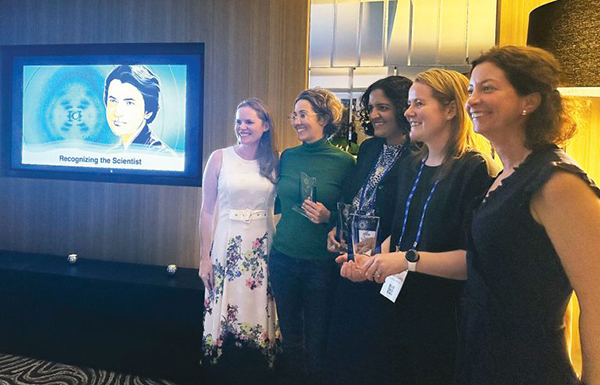
At AGBT 2023, the Rosalind Franklin Society and Rosalind, a software company, inaugurated the Women Changing Science awards program. It recognizes women who not only produce outstanding science, but who also dedicate themselves to supporting other women in the genomics community. The four winners this year were (in alphabetical order) Aruna S. Ayer, PhD, BD Biosciences; Julia Kennedy-Darling, PhD, Akoya Biosciences; Pardis Sabeti, MD, PhD, Broad Institute; and Yan Zhang, PhD, Mission Bio. In this image, award presenters flank three of the winners: Sabeti, Ayer, and Kennedy-Darling stand second, third, and fourth from the left. Read more.
COVID expert Angela McLean is UK’s new chief scientific adviser.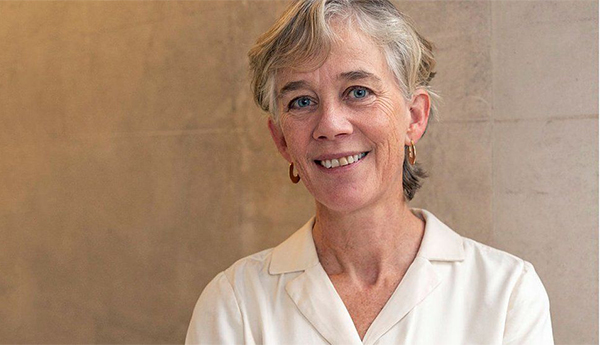
Angela McLean, a mathematical biologist who helped to build models to study the spread of COVID-19, has been appointed as the UK government’s next chief scientific adviser. She will be the first woman to hold the role since it was created in 1964. She will take over from Patrick Vallance on 1 April. Read more. Image: Gov.uk
Women’s Venture Competition.
The annual AIM-HI Women’s Venture Competition provides critical early-stage funding for women entrepreneurs in oncology. The winning company receives up to a $1 million equity investment from AIM-HI and co-investors, subject to due diligence and negotiations, to fund pre-clinical investigations. Ultimately, this financing helps to bring next-generation therapeutics, diagnostics, and prevention technologies to patients. Apply by March 15. Read more.
The V Foundation announces a grant program to increase female representation in cancer research.
In an attempt to combat inequities in funding, the V Foundation, a major cancer research charity, established a new grant program aimed at increasing the representation of women and women-led innovation in cancer research. A Grant of Her Own: The Women Scientists Innovation Award for Cancer Research is one of a few grant programs designed to address gender inequities in cancer research funding. The foundation will give $8 million or more in grants to outstanding women researchers at various stages in their careers. Read more. (Image by The V Foundation)
Unlikely Rebels With a Very Good Cause.
Bonnie Garmus (author of Lessons in Chemistry) reviews Kate Zernike's "The Exceptions: Nancy Hopkins, MIT, and the Fight for Women in Science." The Exceptions centers on the life of Nancy Hopkins, a reluctant feminist (and an RFS board member) who became the leader of the sixteen and a hero to two generations of women in science. Hired to prestigious universities at the dawn of affirmative action efforts in the 1970s, Dr. Hopkins and her peers embarked on their careers believing that discrimination against women was a thing of the past--that science was, at last, a pure meritocracy. Read more.
Life Biosciences Appoints Sharon Rosenzweig-Lipson, PhD as Chief Scientific Officer.
"Dr. Rosenzweig-Lipson brings great scientific and strategic leadership to Life Biosciences," said Jerry McLaughlin, Chief Executive Officer at Life Biosciences. "Sharon has been serving as a consultant to Life since early 2021 and has helped to create strong processes to accelerate our drug discovery and development. Read more.
Access to gene therapy for rare diseases when commercialization is not fit for purpose.
Claire Booth, MBBS, PhD, from University College London, is the corresponding author of the article in Nature Medicine titled “Access to Gene Therapy for Rare Diseases When Commercialization Is Not Fit for Purpose.” Read more.
Platinum anniversary of the double helix in GEN.
In its February issue, Genetic Engineering & Biotechnology News celebrates the platinum anniversary of the discovery of the double helix structure of DNA. In the issue, GEN talks with biologist and author Matthew Cobb, PhD, professor of zoology at the University of Manchester, who is familiar with the early history of molecular biology. He speaks to GEN about the discovery of the double helix and the essential role that Rosalind Franklin played in the process. Read more.
Vilcek Prizes for Creative Promise.
The Vilcek Foundation has announced an open call for applications for the 2024 Vilcek Prizes for Creative Promise. Three prizes of $50,000 each will be awarded to immigrant professionals in each of two categories: Biomedical Science and Design. Read more.
Women, Black researchers less likely to hold multiple NIH grants.
Researchers who hold at least three grants from the National Institutes of Health (NIH) make up a growing portion of its grantees, according to a new study. White men predominate among these “super” principal investigators (PIs), with women and Black researchers much less likely to be part of this elite group. Read more.
3 Female Goldman Prize Winners, 3 Powerful Approaches to Fighting Climate Change.
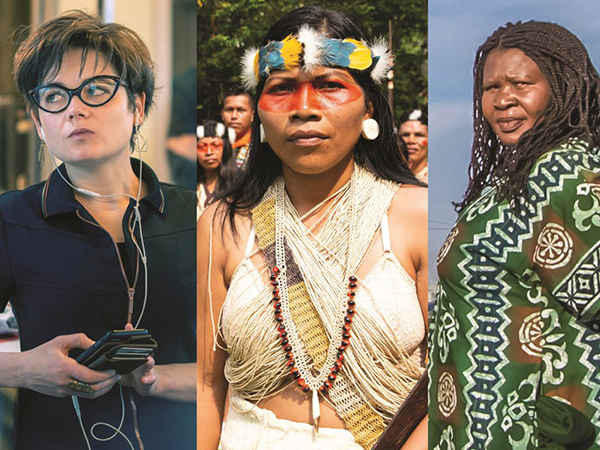
In honor of Women’s History Month and International Women’s Day, the Goldman Environmental Foundation is celebrating three Goldman Prize winners who’ve made formidable contributions to the fight against climate change. These three women, each of whom sought to protect the environment in different ways, are a powerful reminder that climate change isn’t a problem with a single solution. There are innumerable ways to make meaningful change—and each one of them counts. Read more.
Marianna Limas, Social Media Manager
Nilda Rivera, Partnership and Events Manager |
|
|
Dear Colleagues,
I am pleased to include another issue of RFS Briefings with some timely and encouraging updates on women in science.
New in 2023: our Council of Corporate Leadership
Join our first two leadership members: Pfizer, and Rosalind, Inc.!
Emerging from our COVID cocoons, we are excited to launch our new Council of Corporate Leadership (CCL).
With the support of influential corporations, RFS will be able to continue to raise awareness about the underrepresentation of women and minorities in science. Industry leadership and visibility will be a catalyst to meet the challenge of eliminating educational and workforce disparities in the sciences. We look forward to working with you to create and grow this important platform. Please take a few minutes to review the brochure here.
As we plan 2023 initiatives, including our prestigious year-end meeting, we invite CCL members to suggest topics to be featured, as well as speakers. We also hope members will share timely news about their company’s work to be published in our regular RFS Briefings, disseminated bi-monthly by email, and posted on our website. The CCL will also be prominently recognized on our website, in press releases, in communications with our funders, in our conferences and webinars, and in our robust social media. Please check out our 2022 meeting agenda and presentations which are still available on demand.
We envision the new Council of Corporate Leadership as a companion organization to our already established and growing Council of Academic Institutions (CAI). The CAI includes universities represented by our Board and Advisory Board as well as other institutions, across sectors. These two Councils together represent the most important and influential leadership in science. They can expand access. representation, leadership, and much needed progress across disciplines.
We are making a difference, but we are not done...
Please continue to share important news and opportunities with us so that we may share it with you and others who are committed to supporting the careers of exceptional women in science.
Stay safe and sound,
Karla Shepard Rubinger
Executive Director
Rosalind Franklin Society
www.rosalindfranklinsociety.org

Black History Month 2023: Black trailblazers in science and society you should know.
To honor the many Black and African American scientists who have made important contributions to history, BIO highlighted 25 trailblazers who significantly impacted the fields of science and technology. Read more.
She Helped Unlock the Science of the Covid Vaccine.
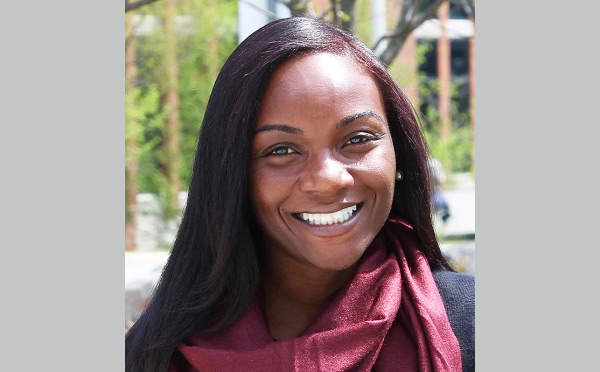
Kizzmekia Corbett helped lead a team of scientists contributing to one of the most stunning achievements in the history of immunizations: a highly effective, easily manufactured vaccine against Covid-19. Read more. Credit: Wikipedia.
Celebrate Women in Discovery Science.
For International Women and Girls in Science Day, Feb. 11, UCSF celebrated some of their laboratory leaders who are taking research to new heights. Can the enzymes behind every living thing adapt to climate change? How soon will we be able to mimic pancreases in a lab to treat diabetes patients? And can we stop the next killer pandemic by understanding virus evolution? Read more.
2023 Lewis Thomas Prize – Suzanne Simard – Monday, April 17, 2023.
The recipient of the 2023 Lewis Thomas Prize for Writing about Science is Suzanne Simard, Ph.D., for her book Finding the Mother Tree: Discovering the Wisdom of the Forest. Dr. Simard is world-renowned for her research on tree connectivity and communication through fungal networks, showing that trees are so much more complex than we originally thought. Save the date for the ceremony: April 17, 2023. Read more.
Science Philanthropy Alliance Welcomes Two New External Science Advisors.

The Science Philanthropy Alliance announced the addition of two external science advisors. Margaret Leinen, Ph.D., and Carla J. Shatz, Ph.D., (RFS board member) will join the Alliance’s existing cadre of distinguished external science advisors in advancing the organization’s mission to expand philanthropic support for discovery science. With a distinguished career that includes being named the first woman chair of the Department of Neurobiology at Harvard Medical School, Carla Shatz has dedicated decades to understanding the dynamic interplay between genes and the environment that shapes brain circuits. Read more.
Women Scientists on the Forefront of Climate Action.
The world’s understanding of climate change has improved exponentially thanks to science, technology and the dedication of some of the world’s top climate scientists. Get to know some of the female climate scientists of the Intergovernmental Panel on Climate Change (IPCC) and their unique contributions to the understanding of the state of our planet and the solutions to the climate crisis. Read more.
She Studies Growing Arteries to Aid Heart Attack Recovery.
Kristy Red Horse, a researcher in regenerative medicine at Stanford University and the Howard Hughes Medical Institute, studies the growth of the arteries that supply the heart with blood and oxygen. Her discoveries may someday help damaged hearts heal better. Her stewardship of her Native American heritage may advance science in other ways too. Read more.
US federal research watchdog gets new permanent director.
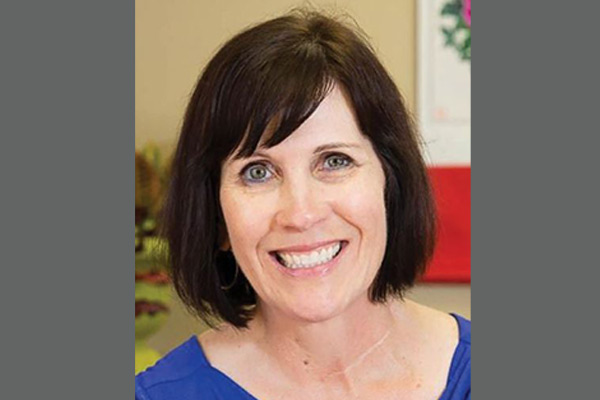
The U.S. Office of Research Integrity, the agency that oversees research misconduct investigations for work funded by the National Institutes of Health (NIH), has a new permanent director after a year and a half without one: Sheila Garrity, currently associate vice president for research integrity and research integrity officer at George Washington University in Washington, D.C. Read more.
International Day of Women and Girls in STEM from a Latin American perspective.
The group “Women in Bioinformatics and Data Science Latin America (WBDS LA)” was founded by women for women and other gender minorities, and activities and administration are run almost exclusively using volunteer hours without dedicated funding. In this article, one of their co-founders, Dr. Ana Julia Velez Rueda (UNQ – CONICET* (Argentinian Scientific Council)) provides a thoughtful and thought-provoking account of gender equality in science in Latin America generally, and specifically within the research community within bioinformatics and data sciences. Read more.
Meet 5 women who are using science to help save the planet.
The UN Environment Programme shines a light on five women who are pushing boundaries and using science to help tackle the triple planetary crisis of climate change, nature and biodiversity loss and pollution and waste. Read more.
‘More women and girls in science equals better science’, UN chief declares.
That’s the message from UN Secretary-General António Guterres for the International Day of Women and Girls in Science, observed this Saturday, who appealed for concrete action to increase their ranks. “On this International Day of Women and Girls in Science, we highlight a simple equation: More women and girls in science equals better science,” said Mr. Guterres. Read more.
Nancy Hopkins: Consummate Scientist, Reluctant Feminist.
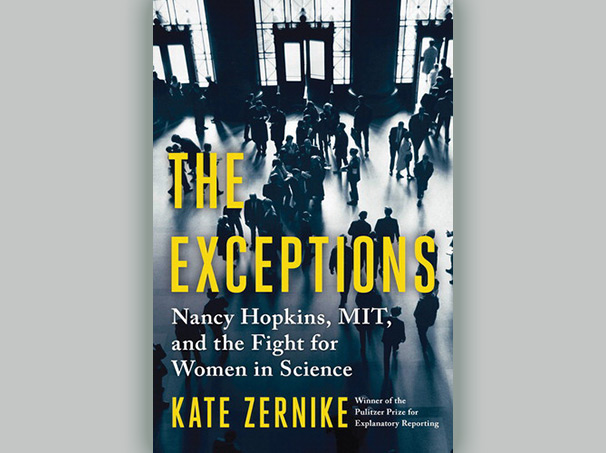
Many people know the story of what Nancy Hopkins did at MIT more than 20 years ago: documenting the concrete discrimination against female faculty. In Kate Zernike’s new book, we are reminded of this ground-breaking research and learn about the progress that has and has not been made. This new book ,'The Exceptions: Nancy Hopkins, MIT, and the Fight for Women in Science', is a chilling piece of history and an important reminder of the impact of leadership, commitment, and numbers. Listen to an exclusive interview with the author from our recent RFS annual meeting here. Professor Hopkins is a founding Board Member of RFS. Read more.
22 pioneering women in science history you really should know about.
History is full of women who made enormous contributions to science. Some of them are rightfully well-known, like Marie Curie, Ada Lovelace and Rosalind Franklin. But others, like fossil hunter Mary Anning and NASA pioneer Katherine Johnson, aren't such household names. So, for this year's International Day of Women and Girls in Science, the BBC Science Focus Magazine put together a list of 22 women in science history who deserve to be remembered for their work. Read more.
Marianna Limas, Social Media Manager
Nilda Rivera, Partnership and Events Manager |
|
Dear Colleagues,
I am pleased to include another issue of RFS Briefings with some timely and encouraging updates on women in science.
Please continue to share important news and opportunities with us so that we may share it with you and others who are committed to supporting the careers of exceptional women in science.
Stay safe and sound,
Karla Shepard Rubinger
Executive Director
Rosalind Franklin Society
www.rosalindfranklinsociety.org

RFS board member Elaine Fuchs awarded Benjamin Franklin Medal in Life Science.
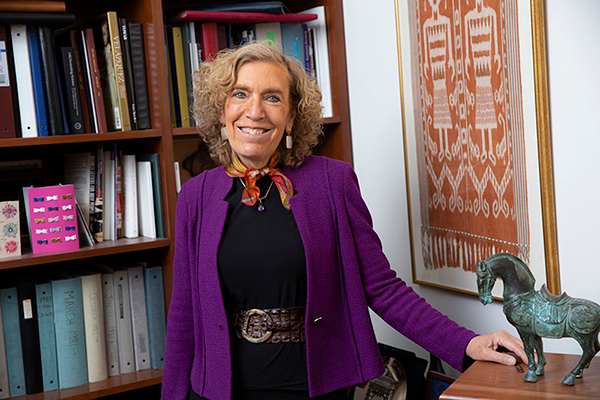
Rockefeller University biologist Elaine Fuchs has been awarded a 2023 Benjamin Franklin Medal in Life Science, one of the oldest and most most venerable honors in the United States. Head of the Robin Chemers Neustein Laboratory of Mammalian Cell Biology and Development, Fuchs uses mammalian skin as a model to illuminate the nature and behavior of tissue stem cells. Read more.
CRISPR pioneer Jennifer Doudna looks to tech's past and future in new review.
While it remains to be seen how delivery, manufacturing and pricing will play out, Jennifer Doudna, Ph.D., and co-author Joy Wang predict that the next 10 years will see CRISPR technology become faster and cheaper to use for applications like genome sequencing. Read more.
The next generation of global health innovators: Michelson Prize winners announced.
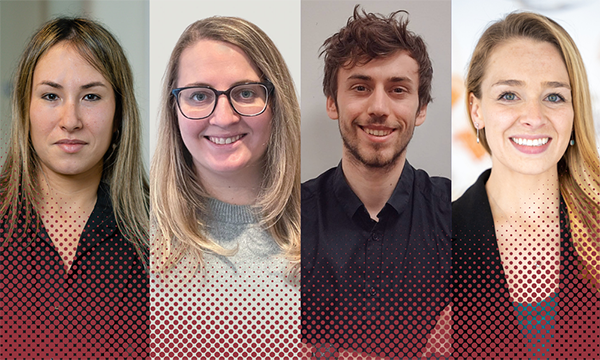
Meet the 2022 Michelson Prizes, Next Generation Grants recipients: Dr. Noam Auslander, Dr. Jenna Guthmiller, Mr. Romain Guyon, and Dr. Brittany Hartwell. The $150,000 Michelson Prizes are awarded annually to support early-career investigators working to advance human immunology, vaccine discovery, and immunotherapy research for major global diseases. Read more.
Women scientists at famed oceanography institute have half the lab space of men.
Women constitute 26% of the scientists at the Scripps Institution of Oceanography (SIO) at the University of California, San Diego (UCSD), but only hold 17% of the space, according to a report. The authors said the differences could not be “explained away” by funding, years at SIO, discipline, or research group size. “Our analysis points to the existence of widespread, institution-wide cultural barriers to gender equity within Scripps,” they concluded. Unfortunately this sounds much like the fastidious research 30 years ago by founding RFS Board Member Nancy Hopkins at MIT. Read more.
Dr. Mona Fouad: “It’s all about the people”
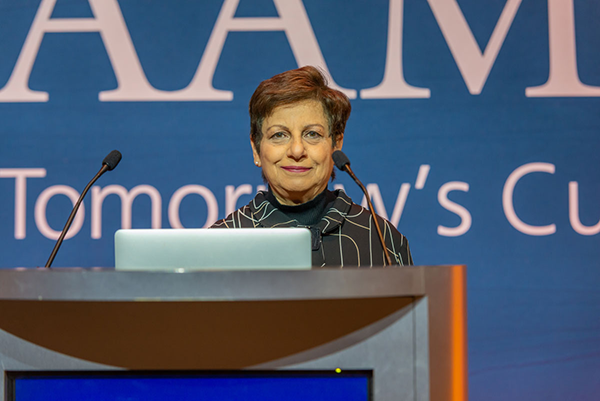
Congratulations to Dr. Mona Fouad, who was presented with the 2022 Vilcek-Gold Award for Humanism in Healthcare at the Association of American Medical Colleges (AAMC) meeting in Nashville, Tennessee, on November 12, 2022. As the founder and director of the Minority Health and Health Equity Research Center at the University of Alabama, Birmingham, Fouad received the award for her career commitment to equity in healthcare. Read more.
A call to create funding equity for researcher-mums.
Mothers in academic research and those who support them say in a report that the funding system can and should remedy gender bias in the sciences. Mothers in Science started a global movement to call on our leaders for immediate action to promote inclusion of caregivers and ensure an equitable distribution of research funding resources. They urge research funders worldwide to begin taking meaningful action and use this action plan as guidance to improve their practices and to cultivate a culture of fairness and inclusion more broadly in the STEMM sector. Read more.
Leaving academia and becoming an online entrepreneur.
Anna Pineda runs an education business that helps scientists to be more productive and to improve their writing skills. She left academia after teaching a yoga and writing course unleashed her entrepreneurial passion. Read more.
Female and black professionals more often viewed as ‘lucky’ than competent when they succeed.
“How we view the success of others from different sociodemographic groups is a crucial leverage point for inclusion and diversity, particularly as women and under-represented ethnic groups continue to be systematically disadvantaged in the workforce. Ignoring this bias has direct implications on individuals and can have knock on effects for future success,” said Odessa S. Hamilton, Behavioural Scientist at LSE’s The Inclusion Initiative and lead author. Read more.
Alondra Nelson to leave White House science office.
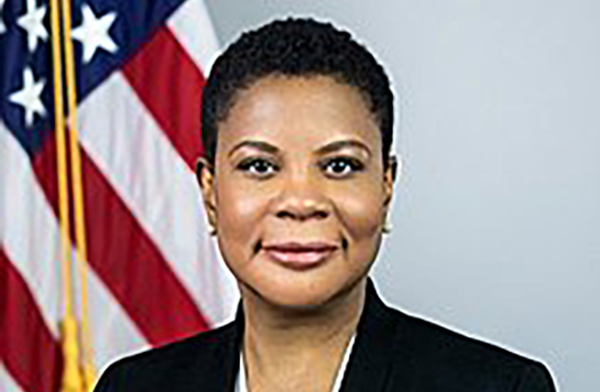
A 64-year-old sociologist, Nelson has a lengthy resume of “firsts” as she has climbed the ranks of academia and government, including being the first Black person, and first woman, to lead the White House Office of Science and Technology Policy.She will be returning to her previous work at the prestigious Institute for Advanced Studies in Princeton. Past home of Albert Einstein. Read more.(Image: Wikipedia)
The Inspiring Women in Science Awards 2023 are open for entries between the 30th January and 8th May 2023.
The Inspiring Women in Science awards celebrate and support the achievements of women in science, and all those who work to encourage girls and young women to engage with STEM subjects and stay in STEM careers around the world. Read more.
When men dominate startups, women take a pass, according to new research.
Women are caught in a “vicious cycle” of underrepresentation in startups, according to new research. If the earliest hiring decisions at a new company exclude women, which they often do, then the organization will have difficulty attracting female talent in the future. As a result, entrepreneurial companies that start with gender disparities have a tough time correcting the imbalance. Read more.
GEN Biotechnology is celebrating its first year of publishing.
We’d like to encourage you to join this dynamic community by submitting your original research. Launched in 2022, GEN Biotechnology is the peer-reviewed sister journal to Genetic Engineering & Biotechnology News (GEN). Led by chief editor Hana El-Samad (Altos Labs/UCSF) and a truly diverse editorial board, GEN Biotechnology aims to publish outstanding research across the full breadth of biotechnology. Read more.
Paying it forward.

Biology and computer science major Sherry Nyeo conducts research on RNA and spends her free time helping other undergraduates take advantage of MIT’s many diverse course and program offerings. Read more. (Photo: Steph Stevens)
Nominate a Researcher in Honor of World Cancer Day.
In honor of World Cancer Day, please take a few minutes to nominate a researcher you believe deserves the 2023 Szent-Györgyi Prize for Progress in Cancer Research. The deadline to submit nominations is midnight on February 28, 2023. Read more.
Marianna Limas, Social Media Manager
Nilda Rivera, Partnership and Events Manager |
|
Dear Colleagues,
I am pleased to include another issue of RFS Briefings with some timely and encouraging updates on women in science.
Please continue to share important news and opportunities with us so that we may share it with you and others who are committed to supporting the careers of exceptional women in science.
Stay safe and sound,
Karla Shepard Rubinger
Executive Director
Rosalind Franklin Society
www.rosalindfranklinsociety.org

Columbia names Nemat Shafik as president, the first woman to lead the university.
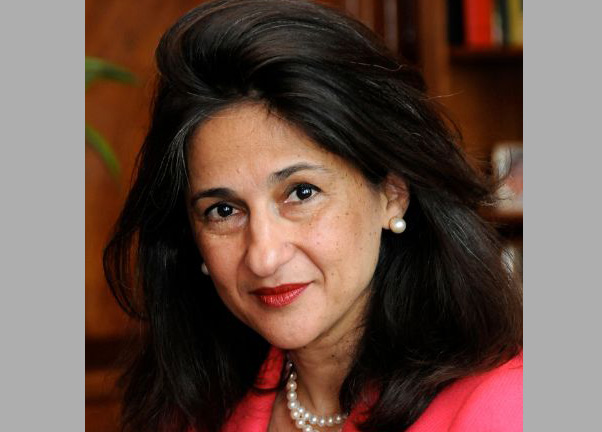
The selection of Dr. Shafik, known as Minouche, marks the first time a woman has been named to lead the prestigious New York institution. In a letter to the Columbia community, the university’s board of trustees said it had found a “perfect candidate” in Dr. Shafik, a “brilliant and able global leader, a community builder and a pre-eminent economist who understands the academy and the world beyond it.” Read more. Image: Wikipedia.
Leadership in science: how female researchers are breaking up the boys’ club.
In this podcast episode, Charu Kaushic, a research group leader at McMaster University in Hamilton, Canada, says that leadership is more than just exercising power, competence and confidence, it is also about wanting to do good. Read more.
MIT scholar to lead the Advanced Research Projects Agency at the U.S. Department of Energy.
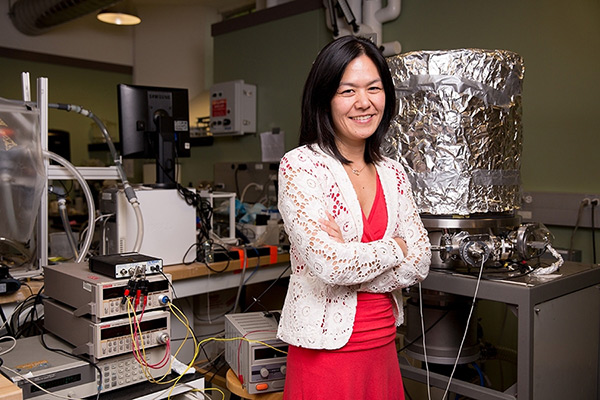
Evelyn Wang, the Ford Professor of Engineering at MIT, has been confirmed by the US Senate as the director of the Advanced Research Projects Agency-Energy at the U.S. Department of Energy. As director of ARPA-E, Dr. Wang will advance the agency’s mission to fund and support early-stage energy research that has the potential to impact energy generation, storage, and use. Read more. Photo: Bryce Vickmark (MIT News)
Leona Zacharias helped solve a blindness epidemic among premature babies. She received little credit.
In the first Lost Women of Science Shorts podcast, host Katie Hafner dives into the life and work of Leona Zacharias—a brilliant researcher who, before reporting this story, Hafner only knew as her grandmother Read more.
Men predicted to outnumber women in physics until the year 2158.
An analysis of nearly 5.5 million scientific papers has found that, on current trends, the proportion of women authoring research won't reach parity with men in some fields for over 100 years. Cassidy Sugimoto at the Georgia Institute of Technology in Atlanta and Vincent Larivière at the University of Montreal in Canada analyzed nearly 5.5 million scientific papers published between 2008 and 2020. Read more.
The American Association of Immunologists announces the 2023 recipients of AAI Awards for outstanding research and career achievements.
The 2023 AAI Award winners will be recognized at IMMUNOLOGY2023™, May 11–15, in Washington, DC. Read more.
Women in science: Cancer research pioneers – part 1
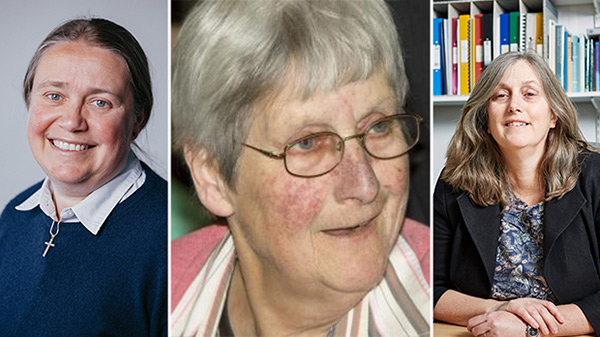
In this article, Cancer Research UK is highlighting three women who have helped bring forward innovative new cancer treatments through their involvement in clinical trials. Professor Ruth Plummer is an oncologist who specializes in treating patients on experimental cancer trials and people with melanoma, Dr. Eve Wiltshaw was a pioneer of medical oncology, and Professor Judith Bliss leads the Clinical Trials and Statistics Unit at The Institute of Cancer Research (ICR-CTSU). Read more.
A top U.S. science oversight board is about to get much more diverse.
On 13 January, Biden announced the pending appointment of seven women and one man for the eight vacancies on the National Science Board (NSB). The new class, which includes five scientists of color, will give the 24-member board a roster that features 10 women, three Black scientists, and three Latino scientists. “The president’s appointments will make this the most diverse National Science Board in history,” says Arati Prabhakar, director of the White House Office of Science and Technology Policy and assistant to the president for science and technology. Read more.
Call for Nominations: The 2023 Vilcek-Gold Award for Humanism in Healthcare.
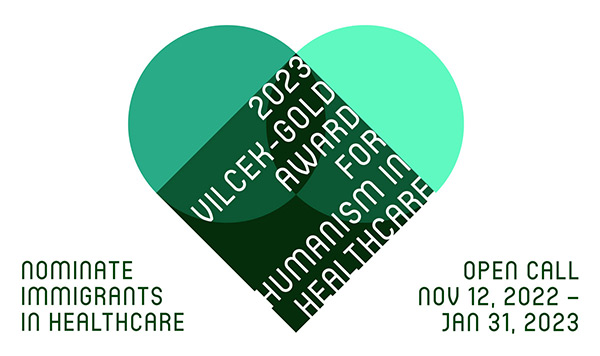
The Vilcek Foundation and The Arnold P. Gold Foundation have announced an open call for nominations for the 2023 Vilcek-Gold Award for Humanism in Healthcare. Nominations will be accepted through January 31, 2023, at 5 p.m. Eastern Standard Time. Read more.
Four women, all marine scientists, plan to row 3,000 miles across Atlantic Ocean.
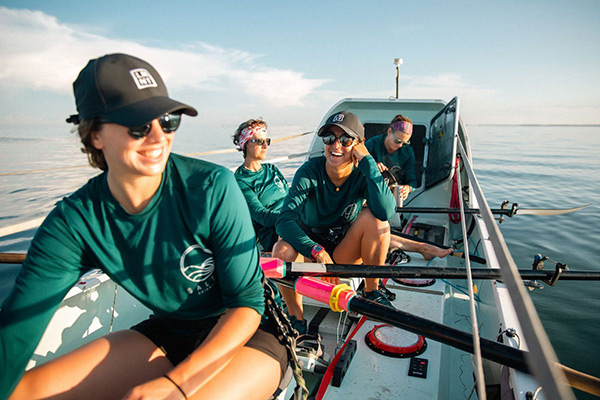
Three generations of USF academics are on a mission "for the oceans". They'll be competing in the 2023 Atlantic Challenge race later this year and hope to raise awareness and money for ocean conservation. "The oceans are facing a lot of threats right now, from climate change to overfishing, and we need people who can solve those problems," says Noelle Helder, one of the Salty Scientists. "We want to help train the next generation." Read more. Image: https://saltyscience.org/
Early Career Fellowships support 25 women scientists in the developing world.
The Organization for Women in Science for the Developing World (OWSD) announced that 25 women have been granted the 2022 Early Career Fellowships. These scientists will receive up to $50,000 to lead research projects and establish research groups at their home institutions to maintain an international standard of research and attract scholars from all over the world to collaborate. Read more.
Marianna Limas, Social Media Manager
Nilda Rivera, Partnership and Events Manager |
|
Dear Colleagues,
I am pleased to include the first issue of RFS Briefings for 2023 with some timely and encouraging updates on women in science.
Please continue to share important news and opportunities with us so that we may share it with you and others who are committed to supporting the careers of exceptional women in science.
Wishing you a happy & healthy New Year,

Karla Shepard Rubinger
Executive Director
rosalind Franklin Society
www.rosalindfranklinsociety.org

White House convenes summit on STEMM equity and excellence.
The White House convened a summit on science, technology, engineering, mathematics, and medicine (STEMM) Equity and Excellence to signal the importance of advancing diversity, equity, and inclusion efforts to achieve scientific excellence. “An equitable science isn’t a luxury, but a necessity if we want to live in a country that is just and that can compete globally in the 21st century,” said Sam Gill, president and CEO of the DDCF. Read more.
A bit of chemistry, a bit of rock ’n’ roll. Nobel laureate Carolyn Bertozzi demonstrated talent for science, creativity even as undergrad.
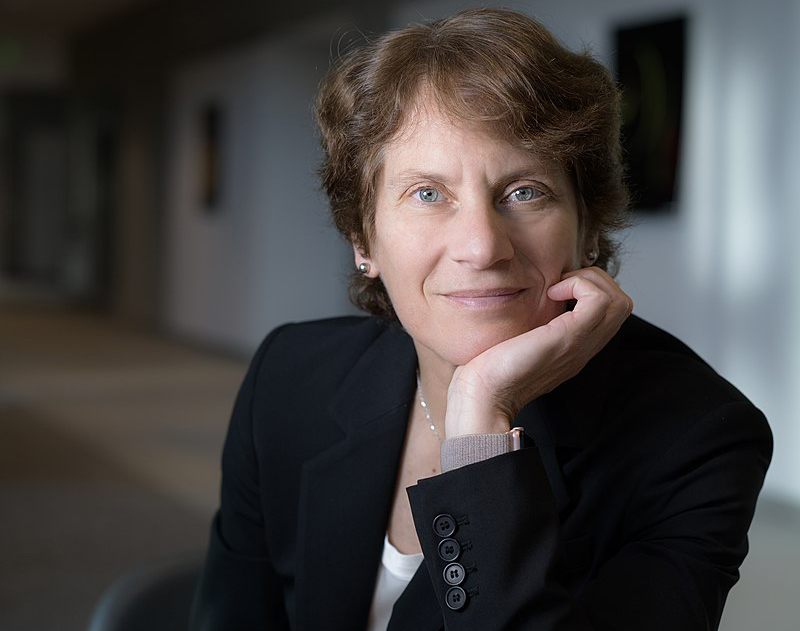
Carolyn Bertozzi’s lab invented bioorthogonal chemistry, which allows chemists to bring molecules together safely in a biological setting. This breakthrough enables chemists to develop new medicines, target medicines toward certain tissues, and see biological molecules in living organisms. Image: Wikipedia. Read more.
Harvard names Claudine Gay as the first Black president of university.
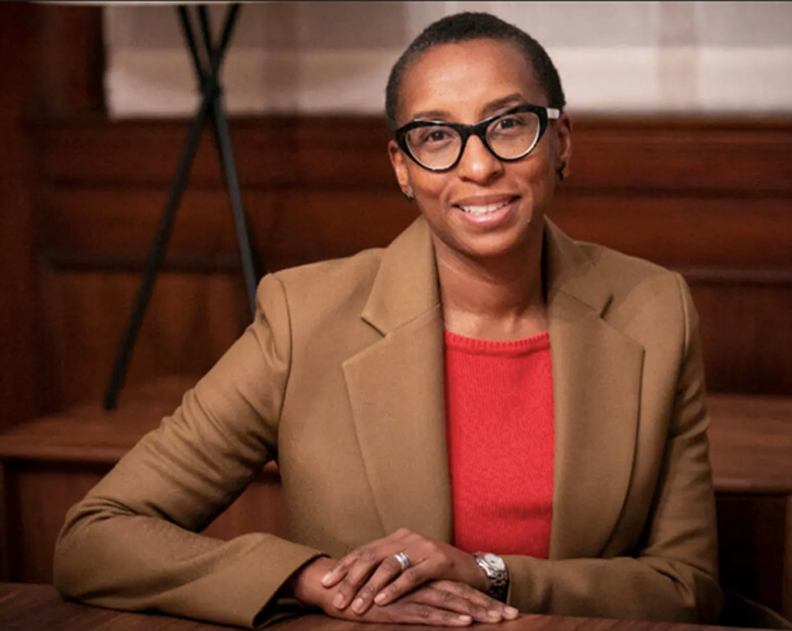
Harvard University recently announced that Claudine Gay will become its 30th president, making her the first Black person and the second woman to lead the Ivy League school. Image by Stephanie Mitchell/Harvard Staff Photographer Read more.
Confronting racism in Black maternal health care in the United States.
In this piece, Maternal-health researcher and obstetrician Kecia Gaither outlines the research needed to save more Black mothers’ lives. Gaither, who is director of maternal fetal medicine at NYC Health + Hospitals/Lincoln in the Bronx, New York, explains how better screening during pregnancy and enhanced anti-bias training for physicians could help turn the tide on maternal death rates. Read more.
Ten simple rules for empowering women in STEM.
According to the progress on the sustainable development goals (SDGs), with a gender snapshot worldwide for 2021, women hold just 28% of jobs in science, technology, engineering, and mathematics (STEM). This article poses ten simple rules on how society could change and prevent gender differences to empower women in STEM. Read more.
“The More Inclusion We Have in Science, the Better Outcomes We’ll Get.”
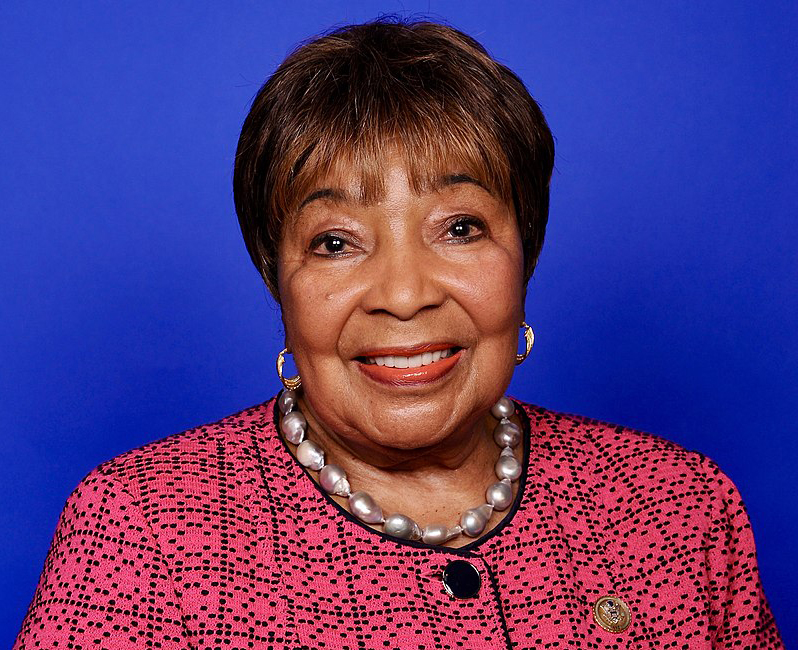
Congresswoman Eddie Bernice Johnson spent five decades in public service, during which she ushered through landmark science and technology legislation and helped to advance opportunities for all Americans. She was also the first woman and the first Black legislator on the House Science Committee. Johnson recently sat down with Issues editor Molly Galvin to discuss the 15 minutes that determined her career in politics, how the semiconductor chip transformed Dallas, and her hopes for the future of the scientific enterprise. Read more. Image: Wikipedia.
Asian researchers face disparity with key U.S. science funding source.
White researchers fared best in winning grants from the National Science Foundation, a study says. Asians encounter the highest rate of rejections, challenging an academic stereotype. “There’s this model minority myth that is a stereotype that suggests that Asians don’t experience academic challenges,” said Christine Yifeng Chen, a geoscientist at Lawrence Livermore National Laboratory in California and the lead author of the eLife paper. “And that’s not true.” Read more.
Funding opportunity: Science, Technology, Engineering and Mathematics Education Individual Postdoctoral Research Fellowships (STEM Ed IPRF).
The Program is designed to support postdoctoral fellows engaged in experiences that will advance their career goals by developing their expertise, skills, and competencies to conduct fundamental STEM education research. Principal Investigators who are women, veterans, persons with disabilities, and from groups underrepresented in STEM, or who have attended community colleges and minority-serving institutions are especially encouraged to apply. Read more.
Climate Enforcers Need Hard Evidence. Friederike Otto Has It.
When an extreme weather event strikes, Friederike Otto and her small team of climate scientists—most of them working in their spare time—are the people the world looks toward to tell them whether climate change has made the weather more severe or more likely to be. “I think it’s important to get a more realistic picture of what climate change means,” says Otto, a senior lecturer in climate science at the Grantham Institute for Climate Change and the cofounder of the World Weather Attribution initiative. Read more.
Barcelona City Council and BIST join forces to promote women’s leadership in science.
As part of this agreement, the Barcelona City Council has awarded a direct grant of an exceptional nature to the BIST foundation for the development of the ‘Women leaders in science and technology’ project, which includes a series of activities including a mentoring programme for young women researchers and scientific education projects for students, among others. Read more.
Marianna Limas, Social Media Manager
Nilda Rivera, Partnership and Events Manager |
|
|